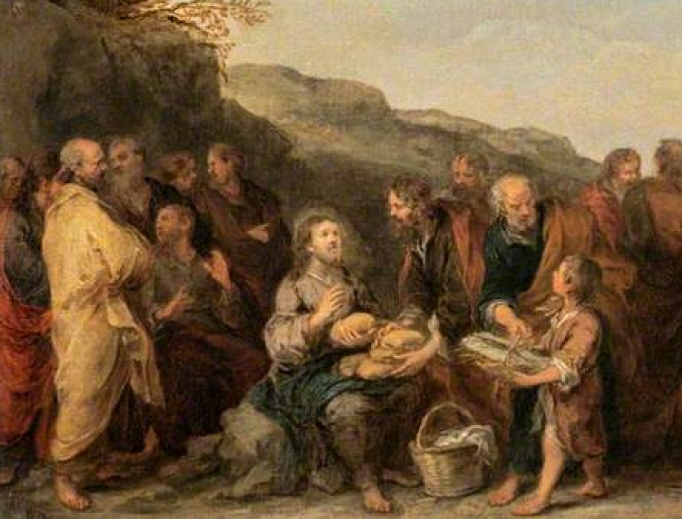Trusting in the One Who Multiplies the Loaves and Fish
User’s Guide to Sunday, Aug. 2

Sunday, Aug. 2, is the 18th Sunday in Ordinary Time. Mass readings: Isaiah 55:1-3; Psalm 145:8-9, 15-18; Romans 8:35, 37-39; Matthew 14:13-21.
St. Paul asks questions that never lose their relevance: “Brothers and sisters: What will separate us from the love of Christ? Will anguish, or distress, or persecution, or famine, or nakedness, or peril, or the sword?” (Romans 8:35). Maybe today we might ask: Will viruses, unemployment, political and social division, or anxiety? The answer for the follower of Christ remains: “No, in all these things we conquer overwhelmingly through him who loved us” (Romans 8:37). Yet do we believe this? Do we believe that, come what may, nothing can separate us from Christ, who longs to fill us with all that we truly need?
Each of today’s readings is a call to just such faith, a faith that leads us to radical trust in God’s providential care. The prophet Isaiah delivers the Lord’s invitation to all to come — without paying or cost — to be fed and to be given drink. The Psalm goes even further, assuring us that the Lord not only feeds us, but even answers all our needs.
Part of the worry of life is that we often feel that our own resources are far too little to meet even our own needs, not to mention the needs of a world embroiled in so much turmoil. This feeling of inadequacy is reflected in the scene in today’s Gospel. When the apostles see the crowd of thousands, they rightly wonder how their meager supplies of five loaves and two fish could make any difference at all.
The only solution to their dilemma and ours is to give freely and to trust in God to bless and multiply our gift to provide as he wills. For many of us, we will experience our poverty not only materially, but particularly in regard to our abilities and our time.
I recall once when I was working against pressing deadlines, and a friend experienced an urgent need. She told me that she was aware that I had very little time and already too much to do, but that she truly needed my help. She assured me that she was going to ask the Lord to “bless and multiply” my time. I was astonished at how quickly I completed every task, and I learned that day to trust much more in God’s generous care.
Since bodily hunger and thirst are so universal and persistent as human experiences, they can serve as an easily accessible metaphor for the deeper hunger and thirst that the Lord desires to fulfill in each of his people. Hints of the deeper meaning implied are already in the ancient prophecies. Isaiah passes from the image of eating and drinking freely to taking in spiritual nourishment: “Listen, that you may have life. I will renew with you the everlasting covenant” (Isaiah 55:3).
God longs to satisfy our every need, to give us our daily bread. This bread is more than the food, shelter, clothing and money we need. This bread is God himself: the only food that can satisfy our deepest hunger. As we approach him in the Eucharist this Sunday, let us entrust to him every area of our lives in which we feel inadequate. When we hand over the loaves and fish of our own small efforts, we just might be amazed that God can give all we need — and even with 12 baskets more.
Sister Mary Madeline Todd is a Dominican Sister of the
St. Cecilia Congregation in
Nashville. She received her
doctorate in sacred theology from the Angelicum in Rome and
currently teaches religion and philosophy at Mount de Sales Academy in Baltimore.
- Keywords:
- eucharist
- miracle of the loaves and fishes
- sister mary madeline todd
- trusting god
- user's guide to sunday

















